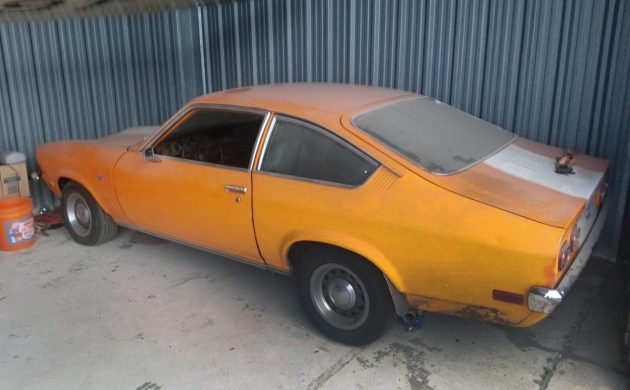
Available from September of 1970 for the 1971 model year until the end of 1977, the Chevy Vega is a great-looking car that came in two body styles and initially sold in pretty high numbers. In fact, so many were sold in just two years that in 1973, Chevy offered a 1973 Chevrolet Vega GT Millionth Vega Edition. This car is listed here on eBay in Haltom City, Texas and bids are up to $4,750 so far.
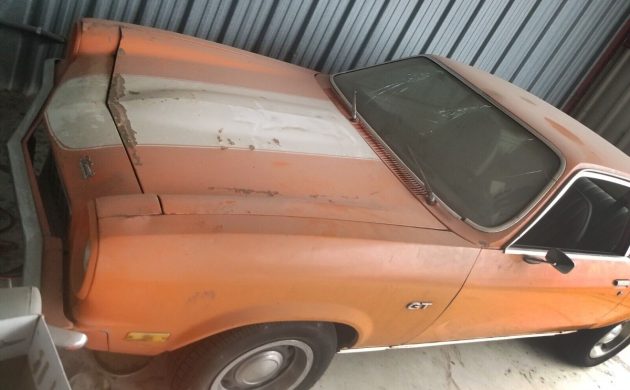
On May 17, 1973, the 1,000,000th Vega rolled off the assembly line in Lordstown, Ohio in this eye-catching orange, a white “Sport Stripe” package, and a white interior. This is a commemorative edition that a lot of us may not have heard of but would probably make this example worth restoring. The seller says that any rust visible isn’t severe and this car is 99% original as far as they know. The windshield is cracked, so add that to the list.
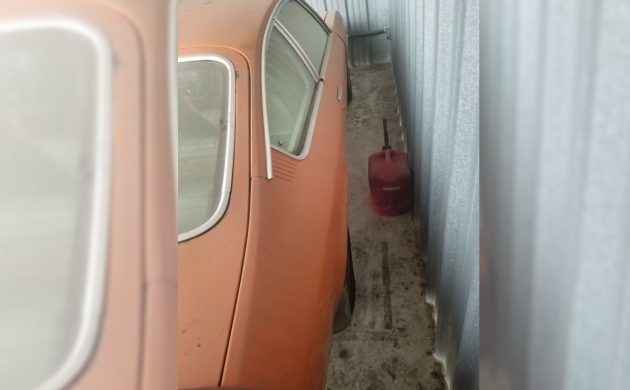
It won’t be an easy restoration as there is some very heavy surface rust underneath and some rust in other areas, like under the window trim, and elsewhere. For just under $500, around 6,500 customers popped for the Millionth Vega option and I don’t remember ever seeing one before. We’ve seen nine 1973 Vegas here on Barn Finds and none of them were Millionth Vega editions. 427,300 Vegas were made in 1973, an incredible number as they don’t show up too often.
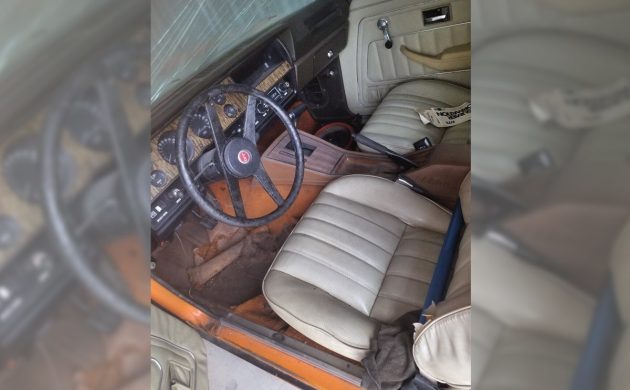
The seller just added a few photos but didn’t show a closeup of the door handle, which should have a special script on it. I tried to enlarge it but it’s too pixelated to read, although it does look like there’s something printed on there. It should look like this. There’s a fair amount of surface rust visible on the floors but hopefully that can be treated before it gets too thin. It’s hard to tell the condition of the seats, but they look pretty good in the photos from what is visible. The rear cargo area also looks nice, hopefully just in need of a good cleaning and more treatment of the heavy surface rust in the spare tire compartment and new seals, as should be done for every window and door.
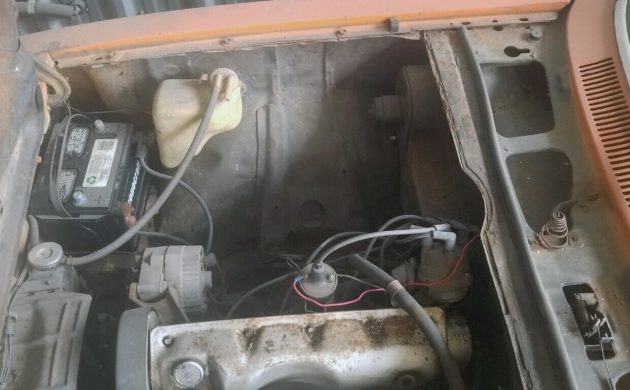
The seller just added an engine photo, thanks to them for adding a few more photos! This should be Chevrolet’s 2.3-liter SOHC aluminum block, cast-iron head, and unlined cylinder bores inline-four, which created a nightmare for Chevy. It had 72 horsepower and 100 lb-ft of torque when new. The seller says that it ran in 2020 when they parked it in this spot but the automatic transmission leaked a lot so that may be why it was parked, we don’t know. There’s no air cleaner and much more work will be required to get this special edition back on the road. Have any of you heard of the Millionth Vega edition?



A girl in my HS had one of these back in ’77-’78. At the time I thought it was “the” millionth Vega. Years later I learned there were more. I always liked the Vega being young and impressionable. It’s too bad GM short changed the car and consumer trust with this car.
Three body styles: hatchback, notchback and Kamback (also available in a delivery config with blanked out rear-quarter windows).
You’re right, sir, thanks for the correction. I was thinking more along the lines of convertible, four-door, etc., but you’re correct.
My father had a 72 notchback with a straight 6, he used it as a commuter car until it overheated in the notorious NYC to Long Island rush hour traffic. The Long Island Expressway really is the world’s longest parking lot. The aluminum head warped, and never sealed right again to the cast iron block. Most likely it was junked, this was around 1979-1981.
The incredibly reliable all iron chevy straight 6 was not avail in vega or monza or S10 truck – too long a motor.
The off the shelf all iron OHV 4 cyl chevy motor(put in not many novas – not the iron duke, but rather a sawed off chevy straight 6) is what chevy should have put in these cars – &(as an option)/or the 2.3 OHC with an IRON block.
I didn’t know they painted the floor pans body color on these.
Chevrolet engineers were never given that option.
Start to finish, this was designed and specified by GM CORPORATE, outside the Chevrolet heirarchy or departments. John DeLorean was exceedingly put out over it – he knew it was a turkey, he was angry it was foisted off on Chevrolet. And given that it was a (new segment) subcompact, it was known right off that it would go to Chevrolet.
But somehow, the top brass of GM just knew they knew better.
You are right, the Chevy II motor would have gone right in. IIRC that four was discontinued in cars in 1969, but Chevrolet was still making them for boats and for the Jeep Dispatcher mail trucks.
And just as silly, they had to re-invent it four years later with the Pontiac Iron Duke – when they could have just brought out the Chevy II designs.
I guess another commentator was right – GM’s idiocy isn’t a recent thing, it has a long history.
Never had a 6cyl, if it did it was done by someone at a garage doing it
No, he didn’t.
The Vega was only offered with the 2300 four in 1972. In 1975, it was upgraded and renamed the “Durabilt 140”
No six was ever offered in any Vega, although later rebadges Monza versions had a V-6.
The melt down in traffic scenario is exactly typical of the aluminum “ready for recycling” Vega 2300 4.
I had a new 1972 Vega GT with the Aluminum 4cyl &b 4 spd trans loved it until the motor started smoking & burning oil-Great car other than that-traded in for a Datsun Pickup then GM came out & offered a Engine repair @ No Cost to the Origonal Owners! They put in Iron sleeves ,New pistons,etc!
Actually, you’ve got it backwards. One of the many reasons the Vega four had so many problems was that GM used a cast iron head with an aluminum block! This was the direct opposite of common practice at the time, which was to use aluminum heads on a cast iron block. Ideally, both the head AND the block should be made of the same material, to have the same thermal expansion coefficient, so if the Vega had both the block and head made from aluminum, it would have prevented a lot of problems down the road. The use of Nicasil-coated aluminum cylinder bores in place of iron cylinder liners was also a problem, for whole bunch of reasons too lengthy to list here, but like so many things GM did back then, it didn’t have to be a problem. GM just plain didn’t know how to use the then brand-new Nicasil coating process, which just added to the Vega’s problems. The process later was perfected and used later by Kawasaki and Yamaha, among others, to coat the aluminum cylinders of two-stroke dirt bike engines used in motocross racing.
Heard of it? I didn’t even know they made a million Vegas.
Apparently they did. Much to the dismay of American roads
They made 2,006,661….
And now there’s 2,006 left running
My data shows 2,113,929 Vegas and Astres manufactured between 1970 (’71 model year) and 1978 and a total of over four million of all H-body cars manufactured through 1980 (the last of the Monzas).
The ‘Millionth Vega’ ZM5 option package cost $497.00 and included:
GT Package
Power Steering
Bright Orange Exterior (code 86)
White Sport Stripes
Light Neutral Custom Vinyl Interior w/exclusive Vinyl Door Panels
Accent-Color Carpeting – Orange
Millionth Vega Door Handle Accents
I have a 1973 GT MILLINOTH Vega with a four gear. I got it back in 2017. Nice running original clean car. I also have a ’74 GT with a automatic and a ’75 GT with a four gear. All clean original good running cars. Back in ’73 I ordered a panel truck. I ran that in NHRA stock eliminator in Y/S.
The disposable car era. Take that junk Pinto and the Gremlin to the junkyard when you’re done with em. However the Gremmy was pretty stout and dependable. I’ve owned all three.
I did too, should have kept my V8 Gremlin out if all of them
Those Gremlins were so incredible! That’s why AMC is still around…oops, my bad
AMC was going to buy the Chevy 153 cube four-banger from GM for the Gremlin and Hornets as a base engine, but GM backed out and AMC has to made do with the 199, 233, and 258 cube Sixes. Supposedly a deal was being made in 1977 to get the Iron Duke, but AFAIK, the deal never went through.
My Dad and brother went to the cabin one weekend and came home with a new Millionth Vega from a Wheaton Minnesota dealership. It was a shock when they came home with it. Dad liked the idea of the limited edition aspect of it and of course they were pretty affordable. That car looked nice and I drove it occasionally and it was what it was which was cheap transportation but I have to admit I liked it. I guess I am partial to them now and have watched for years for a NICE one and I am not sure one exists??
A friend of mine back in Jersey owned 2 Vega GT’s,one worse than the other.
I remember years ago somebody was raffling of a millionth Vega brand new and I bought a ticket. Didn’t win and 20 years later I found it in wrecking yard. I saw the handle and thought I should buy it and be worth something. to find out there were numerous million vegas
Had one exactly like that other than it was a manual. Wisconsin rust in 1978 which means a lot! Cylinder 4 fouled out every one or 200 miles and I cleaned the oil off and continued on. It was my second favorite winter beater I had . Had a $35 66 Pontiac Tempest that someone wanted bad and gave me the Vega and $500 ( for a junior in high school that was huge money in 78) At the end of the winter sold it for $750 and told the guy about the weak engine but he wanted to restore it but all I saw him do was beat the crud out of it smoking away. A month later it was dead. I do have a soft spot for it!
Too bad it never got an old Nova’s all-iron-no-timing-chain-or-belt OHV 4 cyl transplant. It would still be running good today along with a powerglide – both probably still with no repairs, assuming never driven in bad weather to avoid body rust, but even/still driven a lot in fair weather. Somebody out there must have done such a transplant on at least 1 Vega.
Imagine what % of non-rich-family teens THESE DAYS have a “car”(forget 2 doors), or even a driver’s license – or a job.
So why does this not have the GT rallye wheels that most have?
Because it’s a 51 year old car… and how many owners? If cars could only talk!
The early bumper Vega GT’s were a good looking car. Nicely instrumented dash, nice wheel/tire package with the A70/13 white letter tires, the F-41 suspension, too bad the engine was so poor. If I could find a clean, clean Vega GT I would be so tempted…
I will concede that the Vega looked good, like a miniature Camaro from the front, much better than a Pinto, and I like PIntos! The problem was, that buying a Vega was like marrying a supermodel. Great looking, but incredibly high maintenance, LOL! If you find one that hasn’t rusted away to nothing, step one should be an engine swap! Good Luck! You’ll need it!
They made a million because they hoped one of them would have a decent engine…….. No such luck….
GM so loved the Vega, that they used it’s steering wheel on Corvettes and Z-28’s!
That wheel was a rip off of the Porsche bat wing wheel.
One could say that the Porsche wheel is a rip off of a 49-50 Ford. and I’m sure there are others…
barf.
I had a 71′ similar to this in the late 70’s as a “work beater”. I paid a neighbor $175 for it. The guys at work used to kid me about “check the gas, fill the oil ” on it . I used 20w50 and put in four quarts a week. Strangely enough, it lasted over 4000 miles until I sold it to guy in town for $125. Then, bought a 75′ that just about everything broke on, and sold it for most of what I bought it for. Go figure. Last GM cars I ever owned…….
Ditto on the barf.
I had a 73 gt hatchback in a light blue with a black stripe. Added 15 inch American racing vector wheel. The only problem I had with it was a connector broke off of my alternator requiring a replacement. Between my ownership and then selling it to my dad we put over 140k miles on it before my sister rolled it down an embankment and totaled it. The only thing
It took Cosworth to fix most of what ailed the Vega motor, but spending Corvette money for a hot Vega would have been a tough sell even if the original car was any good. With the reputation that the Vega had acquired by the time Cosworth worked their magic on the Vega motor, the car’s, and by extension GM’s reputation, were in the toilet. BTW, Cosworth had additional changes they wanted to make to the Vega motor, to make it even better, but GM refused, which is why the Cosworth Vega only put out 120 horsepower in production trim, but race versions fully prepped by Cosworth could make 200 horsepower! A classic example of being penny-wise but pound foolish!
“The use of Nicasil-coated aluminum cylinder bores in place of iron cylinder liners was also a problem, for whole bunch of reasons too lengthy to list here…” Didn’t Porsche and BMW try the same process, ending with a bunch of warranty problems?
I don’t know, maybe someone else can jog my brain box here! I know that Mercedes was able to avoid the issues of Nikasil coatings by using Reynolds 390 Aluminum alloy. The 390 aluminum alloy contains a high silicon content, about 17%, which hardens the aluminum enough to negate the need for iron cylinder liners, like GM used on the Buick 215 V8 that saw duty in the 1961-63 Y-Body cars (Buick Special/Skylark, Olds Cutlass.F-85/Jetfire, and Pontiac Tempest/LeMans). You know, the one that GM sold to Rover after they gave up on it, only to have Rover make a success out of it.
We had one when I was a kid just like this ‘73 but yellow and black. My dad was letting it warm up in our drive way in January when it literally exploded. We were about to leave in it but luckily nobody was in or near it. I was feeding our dog in the back yard and remember seeing a mini-mushroom cloud appear on the other side of the house. It was an engine fire. My dad was able to put it in neutral, 4 speed, while the engine blazed and we pushed it away from the house. Oddly I’m still fond of that car.
Unlike modern cars where the fast idle lowers by itself, i believe the owner’s manual for any old car with a carb should warn you to manually kick down the fast idle after a minute or 2 after starting & car is just sitting –
or overheating or worse could occur.
You serious? You’re saying the cold fast idle will cause an engine to blow up or overheat? Lol, by golly I believe even a junk Vega motor could handle that lol
Yblocker, i quote my ’74 firebird owner’s manual – & remember – their V8’s & chevy strait 6s in some of their cars back in the ’70s were very robust motors —>
“CAUTION: Extended running of engine(5 minutes or more) [at fast idle] without depressing the accel pedal could cause damage to engine or exhaust system due to overheating”.
IMO, i don’t think it would take much overheating to “grenade” a Vega engine & cause a “mushroom cloud”(lol), espec 1 with say 50k miles on it.
This brings up an interesting point – is a REMOTE STARTER that is installed in a non computer controlled carbureted car able to “tap the accelerator” to lower the fast idle a bit after a minute or so, & then do it again later to disengage it entirely?
Better to just put on a coat, install cloth seat covers over the cold vinyl or leather & drive away gently after a minute or so of idling in cold weather.
Warms up faster that way anyway.
Auction update: this one sold for $4,800!
Amazing!!!
These were pretty popular back in the day as a poor man’s Camaro. A coworker at the grocery store we all worked at bought a new ‘74 GT from the Chevy dealer next door. One snowy night he was showing off to all of us doing donuts in the parking lot after work. Only had the car a few weeks. He went too fast over a dip in the asphalt where there was a drain and bottomed out, tore the oil pan open. We enjoyed his plight as oil ran onto the white snow, he was kind of a jerk and karma got him.
“Auction update: this one sold for $4,800!” Well, there’s no accounting for taste, LOL! Maybe P.T. Barnum was right, “There’s a sucker born every minute and two (2) to take him!”.
Kind of ironic that a car that sold for around $2300 MSRP new now sells for $4800. Go figure.